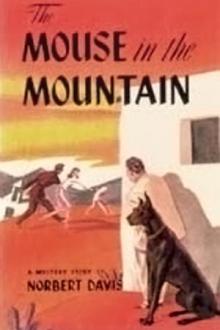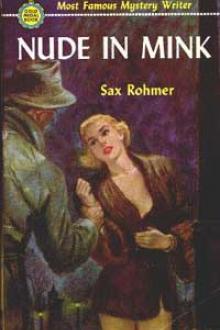Genre Mystery & Crime. Page - 9

his trip just a rumor?"
"Here he comes," said Janet.
Bartolome trotted down the terrace steps and leaned in the door. "Starting instantly in a few moments. Have the kindness of patience in waiting for the more important passengers."
"Who are they?" Henshaw demanded, interested.
"The lady of incredible richness with the name of Patricia Van Osdel and her parasites."
"No fooling!" Henshaw exclaimed. "You hear that, Doan? Patricia Van Osdel. She's the flypaper queen. Her old man invented stickum that flies like the taste of, and he made fifty billion dollars out of it"
"Is she married?" Mrs. Henshaw asked suspiciously.
"That is a vulgarness to which she would not stoop," said Bartolome. "She has a gigolo. They come! Prepare yourselves!"
A short, elderly lady as thin as a pencil, dressed all in black that wrinkled and rustled and glistened in the sun, came out on the terrace and down the steps. She had a long, sallow face with a black wart on one cheek and t

't," said Edwards.
"You're on," said Carter.
"Let me in," suggested Ives.
"And I'll take one of it," said McGuire.
"Come one, come all," said Edwards cheerily. "I'll live high on the collective bad judgment of this outfit."
"To-night isn't likely to settle it, anyhow," said Ives. "I move we turn in."
Expectant minds do not lend themselves to sound slumber. All night the officers of the Wolverine slept on the verge of waking, but it was not until dawn that the cry of "Sail-ho!" sent them all hurrying to their clothes. Ordinarily officers of the U.S. Navy do not scuttle on deck like a crowd of curious schoolgirls, but all hands had been keyed to a high pitch over the elusive light, and the bet with Edwards now served as an excuse for the betrayal of unusual eagerness. Hence the quarter-deck was soon alive with men who were wont to be deep in dreams at that hour.
They found Carter, whose watch on deck it was, reprimanding the lookout.
"No, sir," th

and his condition evidenced the keenest poverty, this sally was treated as a fine joke by the overseer and the understrappers, who roared with laughter, and swore that they had never heard anything better in their lives. It roused my blood, however, to boiling pitch, and I resolved that, come what might, I would not desert my friend.
"If you send him away to the Mail Change," I cried, looking Bartrand square in the eye, "where you hope they won't take him in--and, even if they do, you know they'll not take the trouble to nurse him--you'll be as much a murderer as the man who stabs another to the heart, and so I tell you to your face."
Bartrand came a step closer to me, with his fists clenched and his face showing as white with passion as his tanned skin would permit.
"You call me a murderer, you dog?" he hissed. "Then, by God, I'll act up to what I've been threatening to do these months past and clear you off the place at once. Pack up your traps and make yourself scarce within an hour, o

self as if I was cruel in going to be married and not helping you. It ain't kind. Now, is it kind, Poor Thing?"
"Sally! Hear me, my dear. My entreaty is for no help in the future. It applies to what is past. It is only to be told in two words."
"There! This is worse and worse," cries Sally, "supposing that I understand what two words you mean."
"You do understand. What are the names they have given my poor baby? I ask no more than that. I have read of the customs of the place. He has been christened in the chapel, and registered by some surname in the book. He was received last Monday evening. What have they called him?"
Down upon her knees in the foul mud of the by-way into which they have strayed--an empty street without a thoroughfare giving on the dark gardens of the Hospital--the lady would drop in her passionate entreaty, but that Sally prevents her.
"Don't! Don't! You make me feel as if I was setting myself up to be good. Let me look in your pretty face again. Put yo

crop upagain wherever the hair grew thin, lending him the appearance of abadly-singed pup.
His pet superstition was that, as long as he refrained from practisinghis profession in Paris, Paris would remain his impregnable Tower ofRefuge. The world owed Bourke a living, or he so considered; and it mustbe allowed that he made collections on account with tolerable regularityand success; but Paris was tax-exempt as long as Paris offered himimmunity from molestation.
Not only did Paris suit his tastes excellently, but there was no place,in Bourke's esteem, comparable with Troyon's for peace and quiet.Hence, the continuity of his patronage was never broken by trials ofrival hostelries; and Troyon's was always expecting Bourke for thesimple reason that he invariably arrived unexpectedly, with neitherwarning nor ostentation, to stop as long as he liked, whether a day ora week or a month, and depart in the same manner.
His daily routine, as Troyon's came to know it, varied but slightly: hebreakf

ad all the way is like a circus," the young soldier observed, "and there isn't a thing to be seen when you get there. The naval airmen were all over the place at daybreak, and Captain Griffiths wasn't far behind them. You didn't leave much for the sightseers, sir," he concluded, turning to his neighbour.
"As Commandant of the place," Captain Griffiths replied, "I naturally had to have the Common searched. With the exception of the observation car, however, I think that I am betraying no confidences in telling you that we discovered nothing of interest."
"Do you suppose that the Zeppelin was in difficulties, as she was flying so low?" Helen enquired.
"It is a perfectly reasonable hypothesis," the Commandant assented. "Two patrol boats were sent out early this morning, in search of her. An old man whom I saw at Waburne declares that she passed like a long, black cloud, just over his head, and that he was almost deafened by the noise of the engines. Personally, I cannot believe that they wou

new trail had not been noticed. It ran deep and well marked through the heavy brush of a gully to a place where the brush commenced to thin, and there it branched into a dozen dim trails that joined and blended with the old, well worn cattle paths of the hillside.
"Somebody's might foxy," observed the man; "but I don't see what it's all about. The days of cattle runners and bandits are over."
"Just imagine!" exclaimed the girl. "A real mystery in our lazy, old hills!"
The man rode in silence and in thought. A herd of pure-bred Herefords, whose value would have ransomed half the crowned heads remaining in Europe, grazed in the several pastures that ran far back into those hills; and back there somewhere that trail led, but for what purpose? No good purpose, he was sure, or it had not been so cleverly hidden.
As they came to the trail which they called the Camino Corto, where it commenced at the gate leading from the old goat corral, the man jerked his thumb toward the west along it

ing a painted ceiling. Oriental rugs and skins of animals were strewn about the marble floor. Beside a square pool guarded by a figure of Pan, banks of mimosa flowered and filled the air with their heavy swooning perfume.
There was a semi-circular recess, like a shrine, approached by three marble steps and veiled by silk curtains of rosy pink.
The existence of this singular apartment was destined to arouse keen curiosity in certain quarters (and before long) and to provoke equally keen incredulity in others.
A high, sweet note, that of a bell or of a silver gong, split the hushed silence, hitherto unbroken except for faint stirrings of lily leaves in the pool when one of several large golden orfe swimming there disturbed them.
Almost noiselessly, a bronze door was opened at the head of a short flight of marble steps. The handrail also was bronze, terminating in a newel post representing a sphinx. A man came down, slowly. He was a man of slight and graceful build. His leisurely move

sh greycalled grisaille, formed the further side of the tiny apartment.
Madame Poulain, turning a key, revealed a large roomy space now fitted upas a cupboard. "It's a way through into our bedroom, monsieur," she saidsmiling. "We could not of course allow our daughter to be far fromourselves."
And Dampier nodded. He knew the ways of French people and sympathised withthose ways.
He stepped up into the cupboard, curious to see if this too had been apowdering closet, and if that were so if the old panelling andornamentation had remained in their original condition.
Thus for a moment was Dampier concealed from those in the room. And duringthat moment there came the sound of footsteps on the staircase, followed bythe sudden appearance on the landing outside the open door of the curiouslittle apartment of two tall figures--a girl in a lace opera cloak, and ayoung man in evening dress.
Nancy Dampier, gazing at them, a little surprised at the abrupt apparition,told herself that they must be

ught over the body of Arthur Tims, Malcolm Sage's chauffeur. Sir John Dene had insisted that a car and a chauffeur were indispensable to a man who was to rival Pinkerton's. Malcolm Sage, on the other hand, had protested that it was an unnecessary expense in the early days of a concern that had yet to justify itself. To this Sir John Dene had replied, "Shucks!" at the same time notifying Tims that he was engaged for a year, and authorising him to select a car, find a garage, and wait instructions.
Tims did not do a barn-dance. He contented himself for the time being with ruffling William Johnson's dark, knut-like hair, a thing to which he was much addicted. Returning home on the evening of his engagement he had bewildered Mrs. Tims by seizing her as she stood in front of the kitchen-stove, a frying-pan full of sausages in her hand, and waltzing her round the kitchen, frying-pan and all.
Subsequently five of the six sausages had been recovered; but the sixth was not retrieved until the next mornin